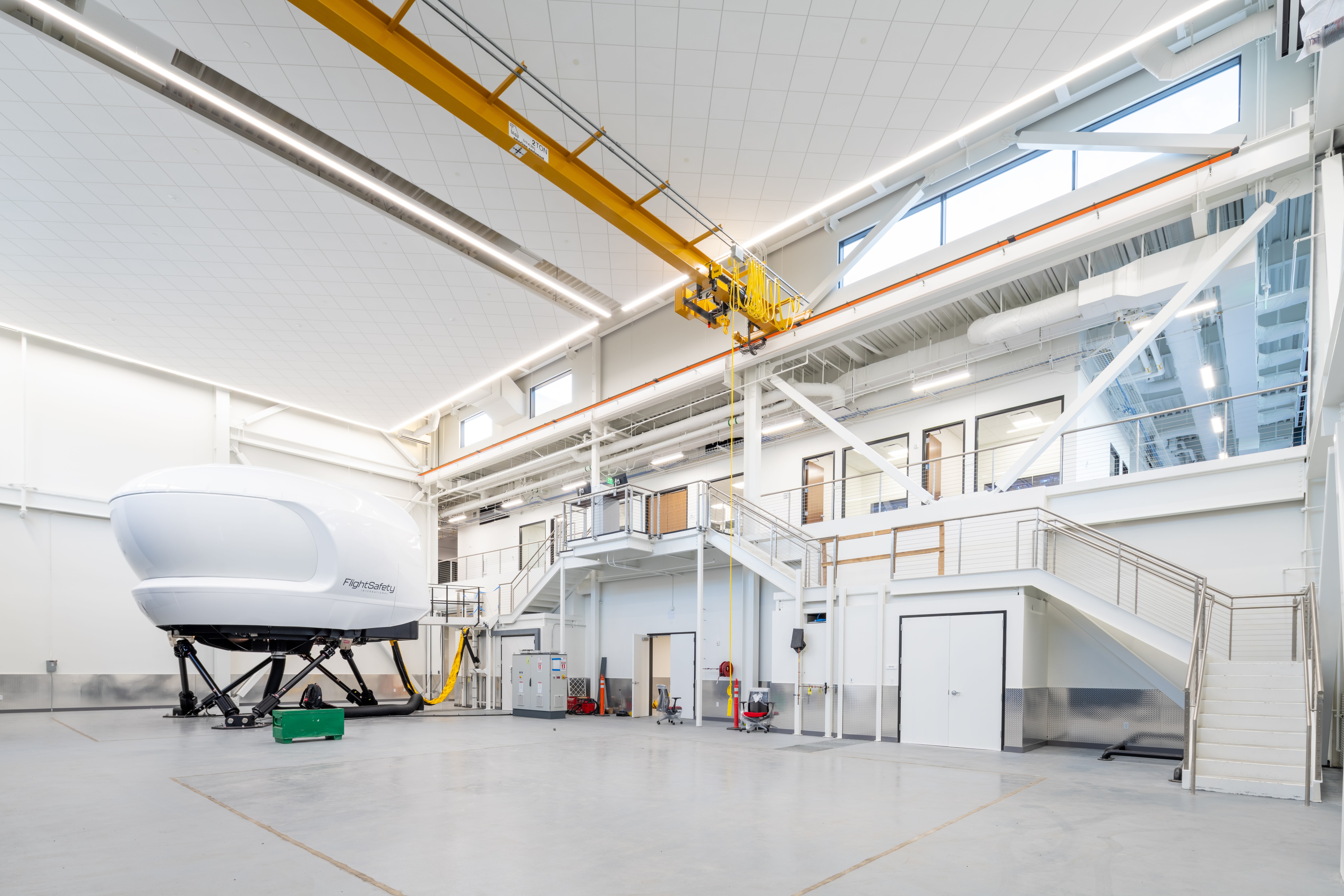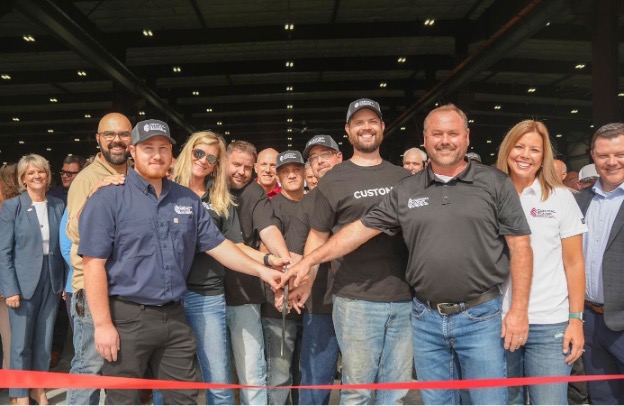Building Together: Trends in Utah Manufacturing Expansions

May 22, 2024
The manufacturing industry has long played an important role in Utah’s economy, and the share of manufacturing companies in EDCUtah’s corporate expansion pipeline has dramatically increased since 2020.
However, the scale of the projects, their challenges in terms of utilities and talent availability, and the locations considered are all shifting in interesting ways.
In this Q&A, EDCUtah’s business development team discusses trends in the projects bringing manufacturing jobs to Utah.
How many project starts and project wins does EDCUtah typically see from manufacturing companies each year? What industries do they represent?
For the current fiscal year (July 2023 – June 2024), we’ve seen 57 manufacturing facility projects. Of 28 total project wins in that timeframe, 18 have been manufacturing. That’s consistent with patterns we’ve seen since the beginning of the Covid-19 pandemic, when office projects slowed, and manufacturing and distribution came to the fore in our pipeline.
The wins have come from companies in a variety of manufacturing sectors, such as advanced materials, aerospace & defense, energy & natural resources, and life sciences. The rest fall into the “other” category, which includes consumer goods, food manufacturing, and other companies. It’s a good balance.
Why are manufacturing companies interested in Utah? Where in the state are they landing?
Utah’s business environment is primarily attractive for our comparatively lower operating costs. That includes a combination of lower utility costs and talent costs. Costs may not feel low for those of us living here, and the cost gap has been closing over time, but it’s still a factor—especially when we’re recruiting manufacturing companies from coastal U.S. cities. When these companies see Utah average hourly rates for assembly positions, they are blown away. If the company is coming from the Midwest, they are seeing comparable prices or maybe prices that are even lower than Utah’s. However, in the context of our surrounding western states, we’re still doing well on cost.
Utah is also pro-business. Both at the state and local levels, companies can secure permits efficiently, especially for large manufacturing projects.
In terms of locations, manufacturing companies are choosing less urban sites more often. A significant amount of manufacturing facilities is landing on the Wasatch Front “shoulder counties,” in places like Juab County, Tooele County, and Box Elder County. These are places where manufacturing companies can access a large labor pool and lower costs for land or building leases. Five years ago, we didn’t receive many inquiries about some of these places. Now there is a lot of interest. Places like Tooele, Saratoga Springs, Eagle Mountain, Payson, and Box Elder County have growing populations who prefer to work locally rather than commute. This means access to a large labor pool eager to work for new, local employers.
What's the local impact of manufacturing companies in Utah?
New, non-residential construction supports local property tax revenue, which helps keep costs lower for cities, offsetting some of the tax burden for residents.
New manufacturing jobs allow residents to live, work, and play in the same community - without having to endure long commutes to other cities.
What role has manufacturing played in Utah’s economy over the years?
Back in the 1980s, Utah’s economy mostly consisted of agriculture, manufacturing, and mining. Leaders at the state, local, and business levels realized that if we wanted to better weather economic downturns, we needed a more diverse economy. That realization led to the creation of a public-private partnership focused on corporate recruitment: EDCUtah.
As we worked to diversify our economy, the manufacturing industry retained its importance as the backbone of Utah’s economy. Nowadays, it lends an overall steadiness. Utah manufacturing companies have helped our economy to grow in related sectors like life sciences, aerospace and defense, and advanced materials.
What shifts are you seeing in project make-up?
Utah manufacturing companies are growing in or near their current facilities, rather than sinking significant capital into new locations. Some examples are Proctor & Gamble and Nucor expanding their existing operations in Box Elder County. Ionic Mineral Technologies in Provo City, instead of relocating to a new facility elsewhere, is expanding into the building right next door.
Companies are more cautious about their real estate commitments than they were a couple of years ago. It was common for companies to build or lease space that they would eventually grow into, and we saw square footage between 250,000-500,000 for the average project. Now we see companies committing to only what they need and then reevaluating if they grow.
How does utility infrastructure impact location decisions?
Nowadays, power capacity is top of mind. Nationwide utility infrastructure constraints are one reason why companies are pursuing smaller expansions. In some cases, it makes more sense to upgrade the power supply to an existing building – whether owned or leased – than to build a brand-new building with the hope of getting power quickly.
It's been surprising to see how quickly the issue has snowballed nationwide. Two years ago, consultants and companies were saying power constraints could be a thing on the horizon. At a more recent site selector conference, power was the number one topic. Site selectors expect to see power capacity challenges at most sites across the U.S.
Let’s talk more about the trend of international manufacturing companies testing the Utah market.
The international manufacturing companies coming into the market are hard to categorize. Some, like Fairmat, have established a robust presence here, while other projects have brought in much smaller operations. In the latter cases, the small presence again denotes a cautious approach of testing the market.
A good number are in the clean-tech space. These companies still have a lot of research and development they need to do. And, coming from an emerging industry, their bankability is not as strong as companies in other industries. Investors are more reticent to fund them in a big way. This all leads to starting small.
What’s the impact of federal funding on manufacturing?
When the project seeks federal funds, timelines are like a slinky toy, expanding and contracting. That’s due to funding stipulations, where the company must identify a potential site and community support as part of the application process. The company is not guaranteed to receive federal funding, so it’s a rush to put the application package together followed by a wait to find out whether they receive the funding.
This is another nationwide issue, with mixed results for Utah. Unless you’re already an established manufacturer like Texas Instruments, some of the newer companies are coming in hot with site selection requests, then easing off because they have to wait six to eight months for the federal funding decision. Federal funding has created a lot of interest in Utah sites, but not many projects have landed here yet.
What’s the role of EDCUtah investors in securing manufacturing wins?
Site selectors travel to different markets in the country, and they notice how well Utahns collaborate to solve problems for companies interested in establishing a presence in the state. The consultants often remark on the quality of service they receive in Utah. Whether it’s state government, local government, city engineers, private sector engineering firms, you name it—Utahns work together.
Without our utility providers, manufacturing projects would be impossible to manage. They’ve done a great job supporting the state and getting those projects running.
As talent availability has become a much larger question in the last two years, talent recruitment firms have played a bigger role in the site selection process.
Our general contractors and civil engineering firms are also answering a lot of infrastructure questions upfront—whether it’s around cost data they are seeing in the market, or timelines needed to get a tilt-up concrete building out of the ground. The willingness of EDCUtah investors to share their expertise with potential projects is a huge plus.
What advice would you have for a manufacturing company looking at Utah?
When it comes to manufacturing, Utah performs exceptionally well. So, the first bit of advice is: come take a look. If the company needs utilities, ask about them immediately to determine if it's possible to set up here. If they have any logistical questions, get those addressed early in the process as well.
Next, partner with EDCUtah! EDCUtah, along with our network of 200 public and private sector investors, helps businesses set up in Utah with ease. It is surprising to some companies, especially those doing their own site selection, how smooth the process can be when they work with a skilled organization like EDCUtah that facilitates every aspect of their potential development.
“Building Together” highlights examples of the collective impact of EDCUtah and our investors in communities across the state. Do you have a story you’d like us to share? Email connect@edcutah.org.






